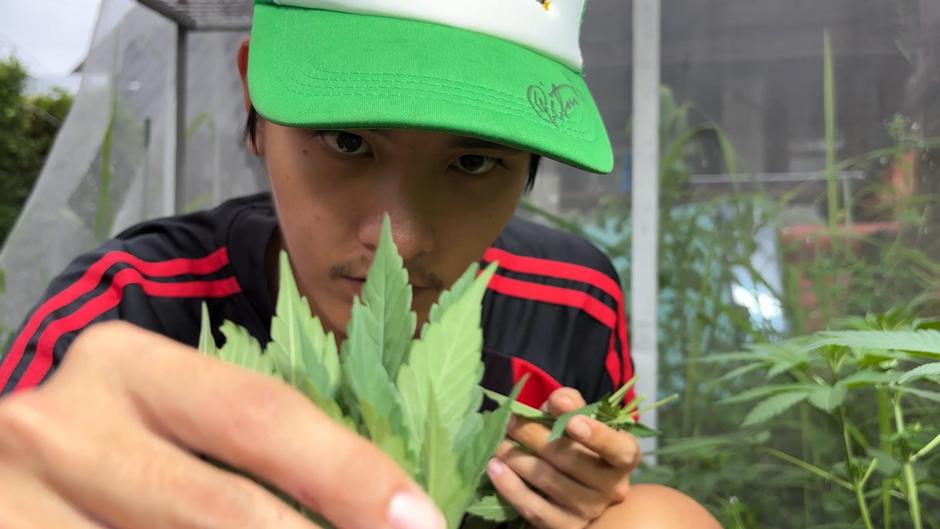Thailand decriminalized cannabis in 2022, however, it did so without a comprehensive law regulating its sale, production or use.
Since then, tens of thousands of licensed dispensaries and retailers selling cannabis and cannabis extracts opened across the country, particularly in tourist hotspots.
Three years later, Thailand is planning to tighten the control of marijuana use, ensuring that cannabis is only used for medicinal purposes and not recreationally.
Under a new medical bill expected to be announced in the next few weeks, dispensaries will be allowed to sell cannabis only to other licensed shops or to customers with a prescription from a medical professional.
Chokwan “Kitty” Chopaka, a well-known cannabis activist in Thailand, says the new medical bill could see a 90% drop in licensed cannabis shops in Thailand.
“I understand what the government is doing. I don’t agree with it,” she told DW.
“I feel the ones that are going to be left are the bigger shops, who actually have that war chest and they will serve the tourists, and the locals will probably grow their own, because getting a doctor’s note is going to be too much of an issue.”
“[There will be] probably only 1,000 dispensaries left,” Kitty added.
What issues has Thailand faced?
The government had hoped that decriminalizing cannabis would turn it into a kind of cash crop for Thailand, boosting its tourism and agriculture sectors, with the Thai Chamber of Commerce estimating it could be worth $1.2 billion (€1.06 billion) annually.
Cannabis dispensaries in Thailand provide a steady source of incomeImage: Tommy Walker
But the lack of a law governing its use created a loophole which has seen a rise in recreational use, illegal distribution and a saturated market. The free use of cannabis has also seen some backlash from activist groups who have protested against its legalization.
Tighter regulations for the use of cannabis also come at a time when tourists have been warned about taking cannabis products out of Thailand. In recent weeks, two British women were arrested in Georgia and Sri Lanka, respectively, for allegedly smuggling cannabis.
Marijuana that has been smuggled out of Thailand also prompts concerns from Thai officials over how easily and in what quantities cannabis can be purchased today.
Thailand’s uncertain cannabis future
Gloria Lai, Asia Regional Director for the International Drug Policy Consortium (IDPC), said the decision for a new bill seems rushed.
“The health minister’s announcement appears to be a knee-jerk reaction to concerns about people smuggling cannabis out of Thailand, and it is questionable whether the proposal to restrict the buying and selling of cannabis to medical prescription only will solve that concern,” she told DW.
“Given the proposal of legislation to regulate cannabis in a more comprehensive manner, it seems more useful to initiate inclusive consultations on those proposals — while allowing reasonable timeframes for inputs from communities impacted by proposed cannabis regulations — rather than rapidly introducing new rules that risk causing greater confusion.”
Rattapon Sanrak, founder and president of the Highland Network, a cannabis organization in Thailand, said the new cannabis bill poses potential problems for the industry.
“Sudden enforcement could cause chaos,” he told DW. “If the law takes effect right away, businesses, the public and officials will not have time to learn the new rules or adjust their work. Changing everything overnight is not realistic.”
But Rattapon believes there is still uncertainty over how long-lasting the new rule will be.
“This bill comes as a ministerial regulation, decided by a single minister. If the minister changes, the rules can flip again. That is risky for an industry that involves huge investments and thousands of jobs. Passing a full Act of Parliament would give the rules a stable, democratic foundation and protect everyone who has invested time and money in the cannabis industry,” he added.
Confusion over the future of cannabis in Thailand has been ever-present since Thailand’s Food and Drug Administration officially delisted cannabis from the narcotics list in June 2022.
Thailand’s ruling Pheu Thai party had initially pushed for cannabis to be reclassified as a narcotic. But in 2023, former Prime Minister Srettha Thavisin told reporters at the UN General Assembly in New York that cannabis would be only allowed for medical purposes.
Pressure from Thailand’s government coalition partner, the Bhumjaithai Party, whose flagship policy was to decriminalize cannabis, has pushed for the plant to remain legal.
The new bill is expected to be a temporary measure before Thailand announces a comprehensive cannabis act to fully regulate the use, production and export of the plant. This is expected to be announced in two years.
Edited by: Keith Walker
Thailand is moving to restrict cannabis to medical use only — but what will the new rules mean for its booming weed industry? Read More


